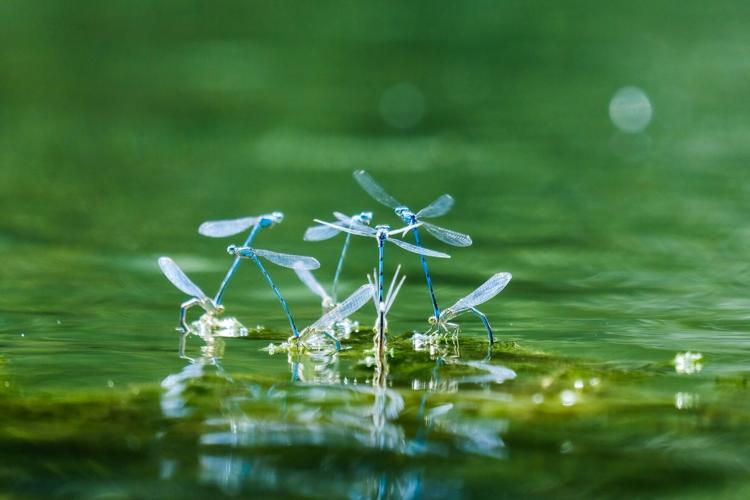
Clément Falize
By Stephen Beech
Dragonflies are facing extinction due to climate change, warns new research.
The iconic insects survived asteroids - but wildfires and climate change may wipe them out, say scientists.
The study, led by scientists at the University of Colorado, found that adaptation alone may not be fast enough to protect the species in a rapidly changing climate.
The research team found that global warming and intensifying wildfires are disrupting dragonfly mating patterns, threatening to push some species toward local extinction.
Their findings, published in the journal Nature Climate Change, show that dragonflies with dark wing spots - traits long linked to attracting mates - are now more vulnerable in a warming world.
The researchers explained that dragonflies play an essential role in ecosystems as they are "major" predators of mosquitoes and serve as food for birds, fish, and amphibians.
They say their decline will ripple through entire food webs.

(Photo by Josh Hild via Pexels)
Lead author Sarah Nalley said: "Dragonflies have survived asteroids, but now climate change and wildfires are threatening them in ways evolution can’t keep up with.
“Our findings suggest that adaptation alone may not be fast enough to protect species in a rapidly changing climate.”
Using 40 years of publicly available data, the study found that the “ornamented” dragonflies are disappearing from burned habitats and hotter regions across the United States.
Thermal imaging revealed that the dark melanin spots on their wings absorb heat faster, causing males to overheat.
As a result, they spend more time resting and recovering and less time competing for mates.
Unlike the case of peppered moths during the Industrial Revolution, where wing colour affected survival by helping moths avoid predators, in dragonflies, wing colouration affects reproductive success - showing that survival alone isn’t the full story and that changes in mating dynamics can push populations toward extinction.

(Photo by Awesome Daily Vlog:
The research team says the study highlights an "underexplored" piece of conservation biology.
While scientists often measure whether species can grow and survive in hotter, drier environments, the new research shows that traits linked to reproduction may be even more critical.
If dragonflies cannot successfully attract mates, the researchers say entire populations may vanish.
Study co-author Dr. Michael Moore said: "This changes how we think about vulnerability.
"It’s not just about whether animals can survive after wildfire - it’s about whether they can reproduce in those modified environments. That’s the key to long-term survival.”
The study began as an assignment in one of Dr. Moore’s classes and relied entirely on publicly available data from sources including the U.S. Geological Survey.
But for PhD student Ms Nalley, the research also carried personal meaning.

Wolfgang Hasselmann
She lost her home in Superior, Colorado, during the 2021 Marshall wildfire and, as a non-traditional student who took time away from school, that experience helped her realise she could channel her passion for wildlife into becoming a conservation biologist.
She said: “I knew I wanted to study animals and, after the fire, I knew I wanted to study wildfires too.
“That experience pushed me to ask how animals are affected not just by surviving a fire, but by whether they can still reproduce and carry on the species afterward.”
The findings carry broader implications for biodiversity and conservation, according to the research team.
They say that if dragonflies - resilient predators that have been on Earth for hundreds of millions of years - are vulnerable, that signals "deeper risks" for many species.
Dr. Moore says the research underscores the urgency of rethinking wildlife management strategies to account not just for survival, but also for mating behaviours and reproductive success.
He added, “Working with Sarah pushed me to think about my own research in a new way.
“She came in with great questions about wildfires and reproduction that made me reconsider how I approach these big ecological issues.”
























(0) comments
Welcome to the discussion.
Log In
Keep it Clean. Please avoid obscene, vulgar, lewd, racist or sexually-oriented language.
PLEASE TURN OFF YOUR CAPS LOCK.
Don't Threaten. Threats of harming another person will not be tolerated.
Be Truthful. Don't knowingly lie about anyone or anything.
Be Nice. No racism, sexism or any sort of -ism that is degrading to another person.
Be Proactive. Use the 'Report' link on each comment to let us know of abusive posts.
Share with Us. We'd love to hear eyewitness accounts, the history behind an article.